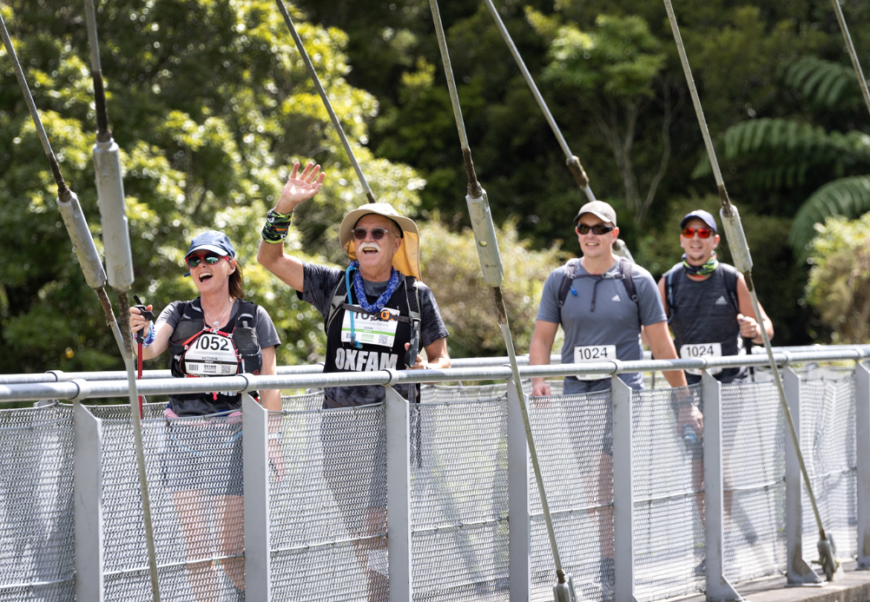Responding to the publication today of the IPCC’s Synthesis Report (SYR), Oxfam’s Climate Justice Lead Nick Henry said:
“This is, literally, the last chapter. The science shows that limiting global heating to 1.5°C is still possible —but only just. Unless we pull the emergency brake on deadly carbon pollution, ‘unheard-of’ heatwaves, storms, droughts and floods will continue to become more frequent and hit more places and people. People living in poverty are bearing the brunt of these climate-induced crises, including mass hunger happening now in Eastern Africa, with a rise of just 1.1°C.
“It’s outrageous that after six massive IPCC reports, 27 climate change conferences, eight hottest years on record, and multiple one-in-one-hundred year extreme weather events —with emissions still rising— governments continue to encourage the oil and gas industry to drill deeper and wider for fossil fuels. More than 600 fossil fuel lobbyists were at COP27 and an oil boss will lead the next climate talks in Dubai.
“Oil giants raked in record profits in 2022. They are extracting these riches from a stricken planet. Their statements of ecological concern ring hollow. If governments had clawed back the massive profits that oil and gas producers funneled to their rich shareholders last year, they could have increased global investments in renewable energy by nearly one-third.
“We can tackle the climate crisis and end poverty. This is not an either-or. If the richest 1 percent stopped squandering so much carbon on private jets, big polluting cars and investments in fossil fuels, the poorest half of humanity could grow their tiny carbon footprints to get their basic needs met.
“To stay within the 1.5°C guardrail, every person on Earth would need to stay below an average of 2.2 tons of CO2 emissions per year by 2030. The richest 1 percent exhaust this remaining ‘carbon budget’ in just 12 days each year, while the poorest 50 percent of humanity emits less than half over an entire year. This inequality is absolutely ridiculous.
“There’s only a sliver of a chance of limiting heating to 1.5°C but we can’t throw in the towel. Every fraction of a degree of heating prevented will be counted in millions of lives saved. Even a half-degree could make it much more difficult to grow crops, raise animals and catch fish.
“We need funds for climate action and deep cuts to emissions —not just by the richest countries, but also by the wealthiest individuals and corporations. Rich countries are most responsible for the climate crisis and must pay their debt to poorer countries by providing sufficient money for adaption, shifting to renewable energy, and addressing loss and damage. There is neither enough time nor carbon left for empty pledges and false solutions like carbon capture and storage. Endless adaptation to climate change is not possible —we need a fast and equitable phase-out of fossil fuels. Otherwise, a catastrophe for people in every country will be just around the corner, and it will be painful.”
Notes
According to the World Meteorological Organization (WMO), the past eight years were the warmest on record globally, fueled by ever-rising greenhouse gas concentrations and accumulated heat.
At least 363 fossil fuel lobbyists were granted access to COP27.
Big Oil more than doubled its profits in 2022 to US$219 billion, more than the GDP of many countries. According to Janus Henderson Investors, the dividends of oil and gas producers totaled US$151.8 billion in 2022. The IEA reports that $472 billion was invested in renewable power in 2022. (151.8/472)*100 equals 32.2 percent.
Keeping to 1.5°C would require limiting emissions to 17Gt of CO2. Divided equally among the global population, this is approximately 2.2 tons per person. The richest 1 percent will emit this amount of carbon in 12 days, the richest 10 percent in slightly over a month, and the poorest half of humanity will emit less than half over an entire year. These calculations are based on analysis published in Oxfam’s “Carbon Inequality in 2030” briefing note in 2021. Oxfam will publish new research on carbon inequality in 2023.
Oxfam’s research found that the investments of just 125 billionaires emit 393 million tons of CO2e each year —the equivalent of France— at an individual annual average that is a million times higher than someone in the bottom 90 percent of humanity.
According to the World Inequality Lab, eradicating global poverty below US$5.50 would entail an increase in carbon emissions of approximately 18 percent. This is roughly equivalent to the emissions of the richest 1 percent (15 percent between 1990 and 2015).








